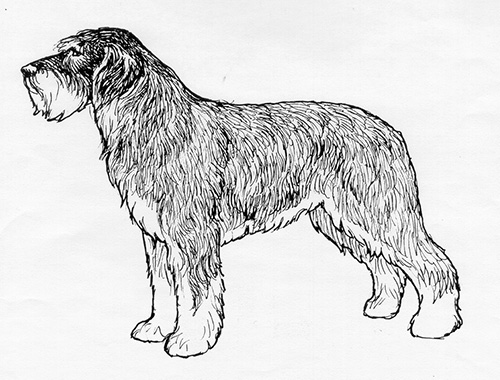Portuguese Sheepdog
Herding Dog Group
The goals and purposes of this breed standard include: to furnish guidelines for breeders who wish to maintain the quality of their breed and to improve it; to advance this breed to a state of similarity throughout the world; and to act as a guide for judges.
Breeders and judges have the responsibility to avoid any conditions or exaggerations that are detrimental to the health, welfare, essence and soundness of this breed, and must take the responsibility to see that these are not perpetuated.
Any departure from the following should be considered a fault, and the seriousness with which the fault should be regarded should be in exact proportion to its degree and its effect upon the health and welfare of the dog and on the dogs ability to perform its traditional work.
History
The Portuguese Sheepdog was developed in Portugal for use as a sheepdog, guard and general farm dog. It is thought to be descended from the Pyrenean Sheepdog with crosses to the Briard. Currently the breed is used particularly in the Alentejo, for guarding and driving all the flocks and herds (sheep, goats, cattle, horses, pigs).
The Portuguese Sheepdog was recognized by the United Kennel Club July 1, 2006.
General Appearance
A medium-sized dog, long coated and fairly long in body, with monkey like characteristics, therefore in his native region he is called the "monkey dog".
Characteristics
Very lively and intelligent, devoted to the flock and the shepherd but wary of strangers and a good night guarding dog.
Head
Strong and broad, not overly long, and never round. The stop is well-defined, and the toplines of the skull and muzzle are divergent.
SKULL
Slightly longer than wide, convex on the sides, but flat between the ears. There is a pronounced median furrow that runs halfway up the forehead. The occiput is prominent.
MUZZLE
Short, only about two-thirds the length of the skull. The nasal bone is straight or slightly hollowed. The lips are tight and thin and do not overlap.
TEETH
The Portuguese Sheepdog has a complete set of evenly spaced, white teeth meeting in a scissors bite.
Disqualifications: Undershot or overshot.
NOSE
Slightly raised from the profile of the foreface, with large nostrils. Black color is preferred, but others are acceptable as long as it is darker than the color of the coat.
EYES
Medium size and rounded in shape. Preferably dark in color with dark eyerims. Expression is lively, intelligent and docile.
EARS
Medium length, with fine leather. Set high and hanging without folds when natural. If cropped, hanging straight and triangular in shape.
Neck
Medium length, blending smoothing into the body, without dewlap.
Forequarters
Shoulder blade and upper arm are of medium length and well muscled, with little angulation.
FORELEGS
Strong and straight, with lean knee joints and fairly upright pasterns.
Body
Longer than tall, with a long back that is level or slightly hollow. The chest is well let down, of medium width, and there is prominent forechest. The ribs are lightly sprung and oval in shape, sloping towards the back of the body. The loin is short, wide and rounded and the croup is slightly sloping.
Hindquarters
Strong and moderately angulated.
HIND LEGS
Straight and well separated when viewed from the rear. Upper thigh is medium length; lower thigh is longer and slightly inclined. The hock joint is rather low and open in angle. Rear pasterns are strong and single or double dewclaws are permissible.
Feet
Round and well knuckled up, with long, tight toes and thick dark pads.
Tail
High set, pointed, tapering towards the base, touching the hocks; when relaxed carried between the legs, more or less arched or curved at the tip; in action spreads out a little curved and fans out or rolls up.
Disqualifications: Natural bob or docked tail.
Coat
Very long, smooth or slightly wavy, forming long beards, moustache and eyebrows, but not covering the eyes. Hair very long on the head, body and legs, including between the toes. Hair of medium thickness and of goat like texture; dense and evenly distributed all over the body; there is no undercoat or wool.
Color
The colours are yellow, chestnut, grey, fawn and wolf grey, with shadings from light to ordinary and dark, and black, more or less marked with tan with or without mixed white hairs, but never with white patches, except a small patch on the chest.
Height And Weight
Ideal height at the withers for males is 17 inches to 21 inches. For females, 16 inches to 20 inches. Weight in proportion to size, approximately 26 to 40 pounds.
Gait
Light, flowing and energetic.
Disqualifications
(A dog with a Disqualification must not be considered for placement in a conformation event, and must be reported to UKC.)
Unilateral or bilateral cryptorchid.
Viciousness or extreme shyness.
Albinism. Undershot or overshot.
Natural bob or docked tail.

Looking for a Dog?
Find a dog that will fit your family.
Note: The breeders on this list are not endorsed by UKC.
©Copyright 2006, United Kennel Club
